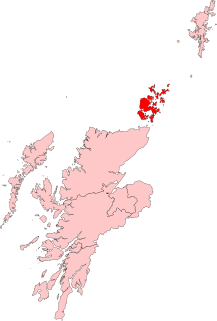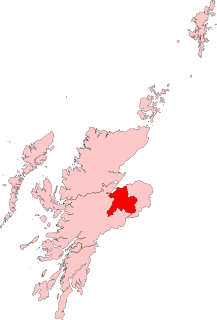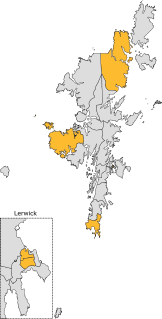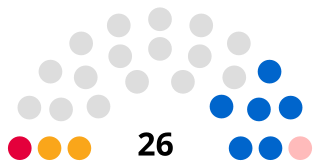
Orkney and Shetland is a constituency of the House of Commons of the Parliament of the United Kingdom. It elects one Member of Parliament (MP) by the first past the post system of election. In the Scottish Parliament, Orkney and Shetland are separate constituencies. The constituency was historically known as Orkney and Zetland.
The Highlands and Islands is an area of Scotland broadly covering the Scottish Highlands, plus Orkney, Shetland and Outer Hebrides.

Argyll and Bute is a constituency of the Scottish Parliament (Holyrood) covering most of the council area of Argyll and Bute. It elects one Member of the Scottish Parliament (MSP) by the first past the post method of election. It is also one of eight constituencies in the Highlands and Islands electoral region, which elects seven additional members, in addition to the eight constituency MSPs, to produce a form of proportional representation for the region as a whole.

Orkney is a constituency of the Scottish Parliament (Holyrood) covering the council area of Orkney. It elects one Member of the Scottish Parliament (MSP) by the first past the post method of election. It is also one of eight constituencies in the Highlands and Islands electoral region, which elects seven additional members, in addition to the eight constituency MSPs, to produce a form of proportional representation for the region as a whole.

Shetland is a constituency of the Scottish Parliament (Holyrood) covering the council area of Shetland. It elects one Member of the Scottish Parliament (MSP) by the first past the post method of election. It is also one of eight constituencies in the Highlands and Islands electoral region, which elects seven additional members, in addition to the eight constituency MSPs, to produce a form of proportional representation for the region as a whole.

The Orkney Islands Council, is the local authority for Orkney, Scotland. It was established in 1975 by the Local Government (Scotland) Act 1973 and was largely unaffected by the Scottish local government changes of the mid-1990s.

Inverness and Nairn is a constituency of the Scottish Parliament (Holyrood) covering part of the Highland council area. It elects one Member of the Scottish Parliament (MSP) by the first past the post method of election. It is also one of eight constituencies in the Highlands and Islands electoral region, which elects seven additional members, to produce a form of proportional representation for the region as a whole.

Skye, Lochaber and Badenoch is a constituency of the Scottish Parliament (Holyrood) covering part of the Highland council area. It elects one Member of the Scottish Parliament (MSP) by the first past the post method of election. Also, however, it is one of eight constituencies in the Highlands and Islands electoral region, which elects seven additional members, in addition to eight constituency MSPs, to produce a form of proportional representation for the region as a whole.

Regional elections were held in Scotland on Thursday 6 May 1982, as part of the wider 1982 United Kingdom local elections. Whilst the 1982 elections saw the Conservatives hold up relatively well in England, the Tories did comparatively poorly in Scotland, where their already disadvantageous position worsened. The Conservatives did particularly poorly in Strathclyde, where the Conservative group leader lost his seat.

Elections to Shetland Islands Council were held on 3 May 2012, the same day as the other Scottish local government elections. The election was the second using the seven new wards created as a result of the Local Governance (Scotland) Act 2004, each ward elected three or four Councillors using the single transferable vote system a form of proportional representation, with 22 Councillors elected.
The Shetland Movement was a pressure group and political party created in 1978 to advocate for greater autonomy in Shetland. The group called for the creation of a Shetland Assembly or 'Althing' with limited legislative powers and control over direct taxation. The Movement's membership included several key public figures in Shetland, including local author, politician and compiler of the Shetland Dictionary, John Graham and Shetland Islands Council Convener from 1986 to 1994, Edward Thomason.

An election to Shetland Islands Council was held on 8 May 1986 as part of the regional elections. The election saw Labour gain another two seats on Shetland council, and also saw the Shetland Movement contest the election on a party political platform for the first time. The outgoing three-term Convener, A.I. Tulloch, died just one day before the election.

Elections to the Shetland Islands Council were held on 1 May 2003 as part of Scottish local elections. The Liberal Democrats were reduced to 5 seats, with independent candidates making gains. Eight seats were uncontested.

Elections to the Shetland Islands Council were held on 5 May 1994 as part of Scottish regional elections. The Shetland Movement maintained six seats, while the Liberal Democrats gained representation on the council for the first time. Only ten seats were contested.
Elections to the Shetland Islands Council were held on 2 May 1978 as part of Scottish regional elections, with 11 seats uncontested. The election saw 14 new councillors enter the Shetland Islands Council, an unusually large number, in part attributable to the charged political context surrounding the devolution debate of the late 1970s. Several of these incomers consisted of members of the pro-autonomy Shetland Group, later to become the Shetland Movement, and local Scottish National Party branch, registered as independents.

Elections to Shetland Islands Council were held on 4 May 2017 on the same day as the other Scottish local government elections. The election was the third using seven wards created as a result of the Local Governance (Scotland) Act 2004, each ward electing three or four Councillors using the single transferable vote system form of proportional representation, with 22 Councillors elected.
Elections to the Shetland Islands Council were held on 7 May 1974 as part of Scottish local elections. This was the first election for the all-purpose Shetland Islands Council, as established by the Local Government (Scotland) Act 1973, combining the Lerwick Town Council and the Zetland County Council. The Council operated as a shadow authority until May 1975, when it assumed full responsibilities for local government in Shetland. 11 seats were uncontested.

Beatrice Wishart is a Scottish Liberal Democrats politician who has been the Member of the Scottish Parliament (MSP) for Shetland since 2019. Wishart currently serves as education spokesperson for her party, and has a seat on the Scottish Parliament committees for Education and Skills, for Culture, Tourism, Europe and External Affairs, and for COVID-19. She was elected at the 2019 Shetland by-election, after the sitting Liberal Democrat MSP Tavish Scott stepped down.
Elections to the Shetland Islands Council will be held on 5 May 2022 on the same day as the other Scottish local government elections. Seven wards will be contested, each ward electing two to four Councillors using the single transferable vote system form of proportional representation, with 23 Councillors elected.
Elections to the Zetland County Council were held on 8 May 1973 as part of Scottish local elections. This was the last election for the County Council before its incorporation along with the Lerwick Town Council into the Shetland Islands Council in 1975. Elections were held in every part of Shetland except Lerwick to elect 24 landward members to the County Council, who would be joined by six nominated members from the Lerwick Town Council.














